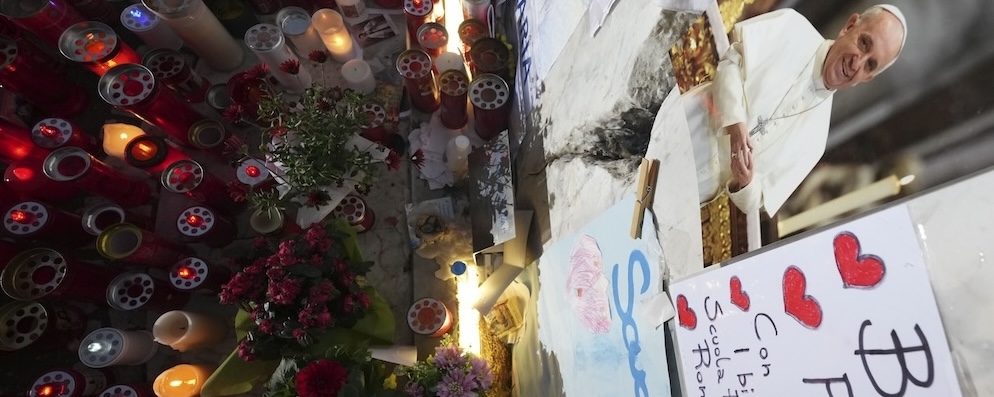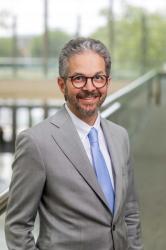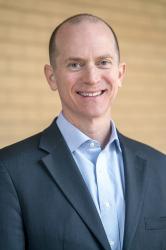On behalf of our colleagues, families, and friends at the Acton Institute in the United States and Rome, we express our heartfelt sorrow and the pledge of our prayers for the eternal repose of the soul of Pope Francis, the 266th Supreme Pontiff of the Universal Church, who passed away today at the age of 88 during the 13th year of his papacy, which began March 13, 2013. We also pray now for the cardinal electors that they may discern wisely with the Holy Spirit when choosing a wise and holy successor of Peter during the ensuing conclave.
In February 2013, Benedict XVI stunned the world by announcing he would soon retire. This act had few precedents in the history of the Church. The last papal resignation occurred in 1415, not as a singular act of humility but as the solution to the Great Western Schism, during which three men claimed the Chair of Peter.
The 2013 conclave also had a surprise, reaching beyond Europe for the first time in many centuries, and, for the first time ever, to the Americas. The choice was Cardinal Jorge Mario Bergoglio, the archbishop of Buenos Aires, Argentina, who was unknown to most Catholics, despite having been a front-runner during the 2005 conclave that elected Joseph Cardinal Ratzinger. In another first, Cardinal Bergoglio was a member of the Society of Jesus, more commonly known as the Jesuits.
It is, of course, too early to measure the legacy of Pope Francis. But we can identify three key areas of emphasis, each of which touches on the freedom and dignity of the human person: the special attention he paid to poverty, his critique of “ideological colonialism,” and his continuity with Benedict XVI in connecting the dignity of the human person to his natural environment.
Care for the Widow and the Orphan
One of the key contributions of Pope Francis’ pontificate was to rekindle among Catholics an awareness for the poor, the excluded, and the downtrodden.
St. James writes in his epistle that “pure religion” is to “care for the widow and the orphan in their distress and to keep oneself unstained from the world.” St. John Paul II challenged communist ideology and the sexual revolution, and called the Church to “be not afraid” and to be not “conformed to the world.” Benedict XVI in his defense of reason and human freedom and his critique of scientism and technocracy called us to renew our minds. Pope Francis stressed that pure religion must include care for the excluded and the downtrodden. He wanted to include the marginalized in the economy so they might flourish spiritually and materially.
In 2009, as archbishop of Buenos Aires, Francis said we “cannot truly respond to the challenge of eradicating exclusion and poverty if the poor continue to be objects, targets of action by the state and other organizations in a paternalistic and aid-based sense, instead of subjects.” Inclusion would mean that “the state and society create social conditions that promote and safeguard their rights and allow them to build their own destiny” as free persons created in the image and likeness of God.
As pontiff, Francis continued to speak clearly about the need for justice—giving people what is their due. He worried about the negative impacts of capitalism, going so far as to call it “the dung of the devil.” We at the Acton Institute have a much more positive view of market economies than did Pope Francis, but as our colleague Alejandro Chafuen, an Argentine and staunch supporter of free markets, has explained, Francis’ critiques of capitalism had some merit. His experience of capitalism was that seen in his native Argentina, where large international corporations received special privileges and favors from the government. He had seen the economic stagnation and poverty caused by this state-corporate alliance that excluded the poor, crowded out civil society, and led to an unequal distribution of wealth and economic freedom.
Here Pope Francis echoed Pope St. John Paul II in Centesimus Annus, who wrote
If by “capitalism” is meant a system in which freedom in the economic sector is not circumscribed within a strong juridical framework which places it at the service of human freedom in its totality, and which sees it as a particular aspect of that freedom, the core of which is ethical and religious, then the reply is certainly negative.
This “capitalism” dismisses private property rights, ignores the rule of law, commodifies everything, even the human person, and excludes people to keep them poor.
No doubt Francis was less enthusiastic about the potential of free, competitive markets than was St. John Paul II. This is unfortunate, because free, competitive market economies that are grounded in the rule of law, respect for private property, human creativity, and individual initiative create the conditions for inclusion that Francis desired. Nevertheless, Francis’ warnings about consumerism, economic injustice, and a “technocratic paradigm” that prioritizes material acquisition over other goods were necessary. As St. John Paul II said, the main failure of socialism was not economic or political but “anthropological in nature.” Its flawed understanding of the human person saw individuals as atoms in a collective: manipulatable, discardable, and unfree. These are the same challenges—the loss of what it means to be a human person—that threaten capitalism today.
We may have some frank critiques of how Pope Francis understood market economies, but those are in the area of prudence. Good Christians can disagree about the best way to organize an economy or alleviate material poverty. The Catechism of the Catholic Church and the Compendium of the Social Doctrine of the Church are clear on this point. We can debate ways to accomplish our shared goal. But what Christians cannot debate is whether we are to care for the poor, because doing so is part of the evangelical mission of the Church.
Ideological Colonization
Pope Francis also spoke eloquently about the dangers of “ideological colonization.” In an address in the Philippines in January 2015, he said:
There are forms of ideological colonization which are out to destroy the family.… While all too many people live in dire poverty, others are caught up in materialism and lifestyles which are destructive of family life and the most basic demands of Christian morality. These are forms of ideological colonization. The family is also threatened by growing efforts on the part of some to redefine the very institution of marriage, by relativism, by the culture of the ephemeral, by a lack of openness to life.… Every threat to the family is a threat to society itself. The future of humanity, as Saint John Paul II often said, passes through the family (cf. Familiaris Consortio, 85). The future passes through the family. So protect your families!
And at the United Nations General Assembly in September 2015, Francis warned of “ideological colonization by the imposition of anomalous models and lifestyles which are alien to people’s identity and, in the end, irresponsible.”
The human person needs freedom to exercise his initiative and creative capacities; freedom to worship God in spirit and in truth; freedom to care for his own family and to educate his own children. In other words, as Lord Acton famously said and as St. John Paul II was fond of repeating, freedom to do what one ought.
Care for Our Common Home
Even more famously perhaps, Pope Francis urged us to care for “our common home,” as he called the earth in Laudato Si’. The green movements want to make this Francis one of their own. Their chief mistake, however, is in thinking about the pope in political categories. Unlike the secular, often zero-growth green parties, but like his predecessors in the Chair of Peter (remember that Benedict XVI was also called the “Green Pope”), Pope Francis never treated human persons as scourges upon the earth. He called abortion “homicidal” and compared having an abortion to “hiring a hitman.”
As he wrote in Laudato Si’:
It is troubling that, when some ecological movements defend the integrity of the environment, rightly demanding that certain limits be imposed on scientific research, they sometimes fail to apply those same principles to human life. There is a tendency to justify transgressing all boundaries when experimentation is carried out on living human embryos.
This integrated human and environmental ecology continued the work of Benedict XVI, who linked concern about the environment to the dignity of the human person. In Caritas in Veritate, Benedict XVI wrote: “If there is a lack of respect for the right to life and to a natural death, if human conception, gestation and birth are made artificial, if human embryos are sacrificed to research, the conscience of society ends up losing the concept of human ecology and, along with it, that of environmental ecology.”
Francis argued in Laudato Si’ that we need “an integrated approach to combatting poverty, restoring dignity to the excluded, and at the same time protecting nature.”
The acceptance of our bodies as God’s gift is vital for welcoming and accepting the entire world as a gift from the Father and our common home, whereas in thinking that we enjoy absolute power over our own bodies turns, often subtly, into thinking that we enjoy absolute power over creation.
Man is neither scourge nor savior nor demon. He is a sinner who can do great harm or great good. Most important, he is created to be a blessing who completes creation and adds value through intellect and labor. In the words of Pope St. Paul VI, in Populorum Progressio, the creation story in Genesis “teaches us that the whole of creation is for man, that he has been charged to give it meaning by his intelligent activity, to complete and perfect it by his own efforts and to his own advantage.”
Pope Francis condemned what he called the “technocratic paradigm” in part because its vision of the human person leaves no room for the co-creator and intelligent actor described by St. Paul VI. This paradigm ignores human dignity as well as the reality of sin by treating all challenges as immanent, technical problems to be solved and persons as objects to be engineered and manipulated.
This same “dominant technocratic paradigm” insists we can transcend nature and even our own bodies. That is why Pope Francis singled out “gender ideology” as “one of the most dangerous ideological colonizations … because it blurs differences and the value of men and women.”
Pope Francis could no doubt create confusion and “make a mess,” as he called it, but he spoke with the best of intentions if not necessarily with the mind of a systematic theologian or a philosopher. But he was a pastor who exhorted us as individuals and communities to integrate the gospel into how we treat the poor, each other, and our natural environment.
Eternal memory! May he rest in peace.


